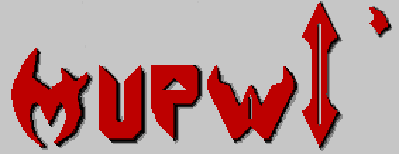
(The Hammer)
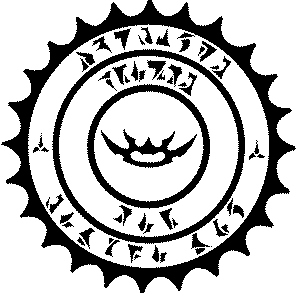
The official Transmission of the Klingon Imperial Weapons Guild.
9802.15____________________________________________Vol.2/No.2
Birth of a Blade
Before a weapon is
the soul of a warrior,
it is first
the heart of the craftsman.
Forged with the heat
of passion,
Cooled with
blood tainted sweat,
Shaped with a
vision of perfection,
as the master wields the hammer.
M'Ikiro 1-19-98
Greetings !
I welcome all of you who appreciate the seductive curves and
radiant warmth of steel fashioned into the perfect Klingon blade - the 'etlh
vaQqu' !! Whether you are fortunate enough to create your own custom weapons,
aspire to learn the art or just want to associate with blade-smiths, *The Guild*
is here to serve you and the Empire.
This month I am honored to have one
of our member's creative works displayed above. My long time friend, M'Ikiro has
really captured the *passion* involved in making these works of art - so much so
that it will become a permanent part of the *mupwI'* title section. Think of it
as the *code* of the blade smith.
A lot has happened this past month
both good and bad. The final materials for the *Kri'stak Collection* have been
acquired and I only have to find the strength to produce four more blades. I
have elected to display 14 bladed weapons and one bludgeon in order to give
myself some cushion on the deadline. You'll be able to see the collection take
shape on the *Weapons from Kri'stak* page. For those of you without web access,
I'll provide a complete list when they are finished.
I have added links
to the Praxis site for your convenience and we have a prominent listing on their
site. The Guild is getting some good PR.
I bought a new computer and it
has been the main cause of the delays in this month's *mupwI'*. Transfering info
and getting it organized like I want it has been worse than buying a new house
and moving. I am afraid I have lost some letters.......I am not sure of
this.......I just have a strong feeling. If yours does not make it into this
one please re-send it and it will make next month's.
STRENGTH,
SIMPLICITY, POWER and DANGER
I hope you enjoy it. As always your comments
and input are welcome.
mupwI' yI'uchtaH !! (Keep holding the hammer !
)
K'Daq son of Toragh
Master of the Heart of Kri'stak

Hi K'Daq
I just got the Guild newsletter, thanks. Haven't had time to
do more than glance at it, but it looks *very* thorough. I really don't know
very much about blades, despite owning five of them. There's the Klingon dagger,
the SS dagger, the Grey company bash 'em dagger (home made by friend and
otherwise known as the iron bar), the Indian cavalry sabre and a very small,
very sharp knife with a handle made from deerhorn, a gift from a friend. The
Grey Company, btw, is a medieval combat group that uses metal weapons and pulls
blows when fighting, hence the complete lack of any edge or point on this knife
which is about the size of a Roman short sword.
Probably I could use
advice on their care; the sabre in particular is not in good shape. I think it
is an actual historical sabre from the late British in India period, meaning
1930s or 40s, and I have also been told that the SS dagger is genuine . . . by
our plumber, who was over there and saw a few (g).
Success
Keren
Honored friend,
It sounds like you have the start of an excellent
knife collection. There are so many styles and categories of knives that it is
always a good idea to confine your *goodies* to a particular grouping. Combat
knives always make a popular collection. I started with combat/military knives
and added a certain class of *folders* later on (trappers). When I couldn't find
the real *love of my life* I resorted to making them myself.
As far as
caring for old weapons - there are two schools of thought. One is to do a
minimal amount of polishing/grinding to the blade (I prefer this approach). If
you remove large quantities of rust, scale and corrosion you will invariably
remove metal as well and the knife will actually lose value. It is much better
to treat the blade to control/stop rust, keep a good coat of oil on it and
display it as is. Old blades should look old - just like old warriors have a
certain *grace* in old age. I don't know what type of products are available in
Australia - look for a solvent based rust inhibitor or rust remover. Apply it
with a soft rag and follow with a light coat of gun oil. The handles are a
common problem as well. Some are leather and some are wood covered with leather.
If the handle is leather and isn't falling apart, get some glove oil and rub it
into the grip. Then just leave it alone. I have a WWI *trench knife* in almost
perfect condition. It has a peculiar aspect in that it is only beveled on one
side. I met a man with a similar knife and he mistakenly ground a bevel on the
other side of his thinking it needed one. Now his knife is worthless. Avoid
steel wool, sandpaper, even tarnish *dips* can react poorly with the older
alloys.
The other *school* says - restore to original specs if possible.
In certain cases this might be a good idea (with knives that have not suffered
any damage) but it is rarely the case.
As far as your SS knife. I can't
comment on it except to say that counterfeit SS knives are abundant. There are
certain ways to authenticate them that go way beyond *looks*. The really good
fakes can't be determined by routine visual exam - they even have the markings
reproduced closely . This is also a problem with US Civil war blades.
Counterfeiting knives and swords is actually a thriving business.
I am
happy to have you as a part of the Guild. I look forward to your continued
participation.
K'Daq
greetings Master K'Daq !
It's a great honor to have achieved the goal of
membership into " Heart of Kri' stak". I do want to create my own knives and
weapons, so I'll try to get the back issues of * mupwI'* to start with the work
.I need to know what kind of materials and tools are required to start,and if
there's any kind of patterns for each weapon or at least if there's any standard
for each one. The ones I made in wood were made with some data from magazines
videos and books,and with many time involved in looking for details in pho- tos
and magazines.Except for the bat'tleh , (you can find its measurements easily
enough through many fonts ), I managed to create my own measurements and
patterns ( 20 cm. for dk'tagh and qutluch blades , 12 cm for the handle) but I
don't know if there's any approved standard .
I did my replicas on my own
( I'll try to send photos of them to you),with nothing but imagination and some
(few) advices,so I will need a great deal of help and patience this time because
I think I'm less than a novice...I have no idea of anything , but I assure you
,I'm most than eager to learn and to spread the word.
Well,that's all for
now. I promise to ask (in fact,I think I'll rather yell for help than ask ...)
at the very moment I find any doubt.Until then,take care and send my regards and
best wishes to yours.
Kasara
Staff Officer
Argentina
Sector
KIDC
Welcome ZaHra !
It always gives me great pleasure
to read letters from warriors who share the excitement of planning, designing
and producing their own blades.
You have a firm foundation already in
that you have developed an excellent design system. There are no set specs for
Klingon blades - that is what we hope to define at the Guild. One important
point to always remember is that there will never be a fixed standard. Real
weapons produced for real warriors in a real Empire are going to have a range of
sizes and shapes. We can arrive at a set of *industry* standards within
each weapon category.
Your review of the early *mupwI's* should answer
the materials and machines questions but I am always here to clerify any
specific details - so yell anytime .From time to time I will post a pattern
of a weapon that might be hard to come by, but it sounds like you are using the
same technique as most of us when it comes to designing. Lady K'Zin also has a
number of blueprints available from the Kasara Coop if you need additional help.
I look forward to posting your creative works on the Guild site.
K'Daq
Honored K'Daq,
How is your health and also I found a bench grinder with a
wheel on the left and one on the right would that work as a grinding tool or
not?
Morac Kale
Greetings Morac,
Well I am pretty sure my
health has been much better - but why focus on things we can't change?
A
bench grinder is always a good tool to have around. Although you could use it to
make a complete knife, it would be difficult to achieve a quality that you'd be
happy with. Wheel grinders are best at *gross* reduction - that is to say
removal of large quantities quickly and in an *ugly* manner. You could use it to
get the basic bevels formed and then finish the knife with hand tools or belt
grinders.
You can also put a polishing wheel on one side of the grinder
and use compounds when applying the final finish to your projects.
I have
just finished reading this month's *Knives Illustrated* and it lists a resource
that you and many of the members might find useful. It is a book called *How to
Make Knives* by Loveless and Barney. It is available from:
*Knife World
Books*
P.O. Box 3395
Knoxville, TN 37927
The letter writer goes on
to say * If you have a work area, a bench vise, some good sharp files, a
hacksaw, a drill and a fair amount of patience, you will have a beginning
knifemaker's shop. If you don't have a fair amount of patience, you won't make a
good knife with a $20,000 shop.*
Thats a good point. Desire can augment
patience quite a bit.
K'Daq
I've been totally immersed in work lately, 72 hour week last week which is why
I've been quiet. As I finally got to my terminal today I surfed a bit looking
for some info and stumbled on a new news group I thought might interest you and
perhaps some of the other guild members. Its alt.crafts.blacksmithing its only
been in existence since the end of January, but I see some interesting material
flowing there already; of a more generic to metal working/smithing nature to be
sure but a resource is a resource :)
Keep
hammering.
Dennis
Excellent ! Thanks for the info. I rarely go
into news groups anymore - I seem to have lost my free time. hmmmmmm. Well I
will check this out and I would advise other members to do the same. Thank you
honored one.
K'Daq
Awhile back we talked about the naming of forges and I am building a new
site right now that will firstly contain all my other sites, and secondly be my
forge site, that part will mostly just be a link to your site and the various
neat stuff it contains. But the site is going to be based around the central
theme of my forge. There fore it must be named and I would claim the name of tIq
HeH or in earther :) Heart's Edge Forge. Please let me know if this is
acceptable to the master of the Guild.
may'qel vestai
Reshtarc
Dennis
Honored may'qel,
majQa' ! An excellent choice.
One that brings an immediate image of a warrior devoted to Klingon
ideals.
Kai to the Heart's Edge. May your fires always burn
bright.
K'Daq

As the Guild grows, we will try to enhance camaraderie by publishing histories
of our members (both Klingon and Terran). It is not necessary to develop a
family history to be a Guild member, but it does help to solidify an image of
you as a fellow crafts person and Klin.
The Story of may'qel
The story is my tuq's rather then mine but I
will be glad to tell you of myself;
may'qel means "awaits battle" this is
of course the bane of a warriors existence but a necessary part of his life as
he finds his way on lifes path between those defining instances where he is able
to rise in battle and show his craft and spirit in its purest
form.
may'qel is of a farming people on an unnamed colony world far out
in the Mempa sector of the Empire. He left home on the day he became a warrior.
Enlisted in the Imperial Marines and began his climb. Being tadwI' he has far
outlived his family and has fought in most of the Empires major wars in the last
200 years. In this epoch the Marines have begun to keep more of their strength
awake and ready then in the past. Few older Marines escaped the slow death of
freezer burn from their repeated stints in cold storage. may'qel was one of the
luckier ones. Some years ago he was first assigned as Marine Force Leader for
the IKV BortaS on the galatic rim. During his tenure on the BortaS the crew
staged a revolt against the Fleet Command. may'qel is the only surviving
loyalist from the crew. He was then posted to the IKV Hand of Kahless where he
continues to serve. He was sponsored to tuq Reshtarc by his line brother
K'orvette sutai Reshtarc. Within months of joining the family he made an enemy
of K'Paal joH. Before a year was out he stood with the House's cha'Dich in
rebellion against the joH. That cha'Dich is now joH and may'qel stands as a
boQDu' and advisor to the joH.
The kind of close quarters fighting that
Marines are primarily employed in cause a tendency for them to be knive fighters
and may'qel is no exception. A lover of a fine blade, he now begins to learn
more of the art of crafting such.
Excellent. It will be quite interesting
to see what weapons a *pure* warrior can design. I am also pleased to finally
find someone who is older than I am (even though it happened through the miracle
of cold storage). Perhaps we have stood together in past battles ? I am certain
you will realize your goal and that of your Forge. The *Heart's Edge* has an
honorable master and it's weapons will bring glory to many a
warrior.
Next month: House Subaiesh

The history of the ghIntaq - Battle Spear
There are many specific
names for Klingon spears. The general term is naQjej which covers all spears
while ghIntaq refers to a spear used in battle. There are many spears used in
battle that are referred to with names other than ghIntaq but they could also
correctly be referred to as ghIntaqmey.
Spears have been used by Klingons
since the ancient times preceding the Empire itself. The spear is used in a
number of ceremonies ranging from the youth's coming of age, ritual hunts and
drawing of the first blood. These all speak of the ancient and respected
position of the spear in Klingon culture. In early times life on Qo'noS was a
harsh struggle for survival. The spear gave the warriors the ability to fight
the larger beasts of the Homeworld on a more equal footing. The vast assortment
of blade shapes and configurations demonstrates the variety of fighting
techniques and styles utilized by ancient Klingons prior to the developement of
the moQbara'. Each warrior had his own *style* of combat and that was reflected
in his choice of blade.
In keeping with the typical Klingon philosophy in
blade design this weapon attempts to maximize the ability of the blade to
inflict damage. The multiple points and saw teeth in concert with the broad
razor edge would create a wound not many could survive.
As the Klingon
warrior's techniques evolved the ghIntaq was replaced by more practical weapons
that could adapt to a greater number of situations.
Most Houses will
proudly display at least one ghIntaq as a symbol of their heritage. These will
typically be ornately decorated with significant events or symbols of the
House.
Qa'Pla!!!
mupwI' yI'uchtaH !!

ghIntaq - Battle Spear
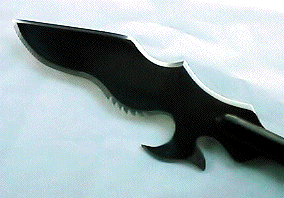
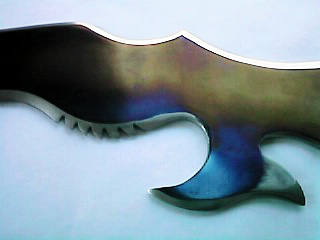
ghIntaq
Dimensions - average:
thickness of blade -- .25 inches
length of
blade -- 17.00 inches.
width of weapon -- 6.00 inches
Shaft
Material -- 50 inch *Dymondwood* Cylinder
Handle material -- 12 inch
carved mahogony dragon reinforced by 5/8ths steel rod
Total length -- 75
inches
weight -- 3.5 pounds
Next month : tajtIq

*Starter* project - Family Warrior's knife or QIS
This month the
tips section continues a step by step construction series for a sheath knife
that the new members can consider making.
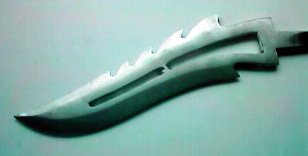
This image
shows the primary bevels and the central cut outs completed. The blade has been
polished to a 400 grit in preparation of the heat treating process. As was
indicated in last month's transmission, the perimeter of the cutouts were
outlined with small holes drilled at regular intervals. Each neighboring pair of
holes were then connected by using a cold chisel to shear the wall. When all the
holes were connected, the *waste* was removed and the walls were straightened up
by hand. This is a tedious process but unless you have specific devises for
getting into the opening, you have no other choice but to hand file. (Yes even
K'Daq runs out of tools occasionally) A milling machine would be nice.
hmmmmmmmmm. We will have a more detailed account of this process in next month's
*mupwI'* when I locate K'Beck's excellent article. Sorry my friend.
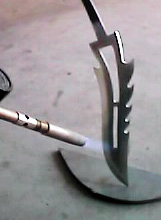
.
This
image shows heat being applied to the titanium in order to bring out the
irridescent colors of the metal. The process procedes well if the blade is held
in this manner and heat is applied to both sides at once. If the metal is only
heated on one side the results are splotchy and undesirable.
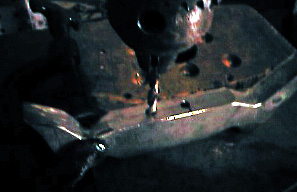
The next
steps deal with *hardware*......ie. the guard, spacers and pommels. You now have
more choices to make. For the beginners it usually is more practical to use a
simple flat guard made from soft steel, brass or a nickel alloy. You can drill
and file an opening for your tang to pass through and smooth the edges of the
guard to provide comfort while holding the knife. The spacer is not needed if
you are new to this - you can substitute more leather washers. The pommel can be
pinned with a rivet or threaded as in this case. You can opt for material other
than metal for the pommel. For example - horn, bone and antler, or any of the
hard woods. You can also use one complete hollow horn to provide handle and
pommel in a single unit. We'll see that next month with the tajtIq.
In
this example I used half inch stainless bar stock and cut out the profile drawn
in the original design. This photo shows the initial holes being drilled for the
tang. The opening will be filed to a smooth rectangle of 3/16 X 1/2 inch and the
tang will be thinned to 3/16th of an inch. This produces a shoulder at the base
of the blade and a cleaner fit of blade to guard.
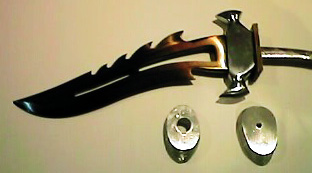
In this
photo you see the guard, spacer and pommel after they have been inititially
shaped. The guard has been completed and polished to eliminate using polishing
wheels etc around the completed blade. The spacer and pommel will be shaped to a
final fit after assembly to allow for variations in the warrior's hand.
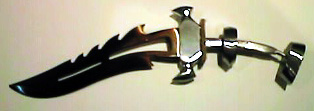
This photo
shows the hardware in a test fit on the tang to finalize their positions and to
get a measurement for leather needed.
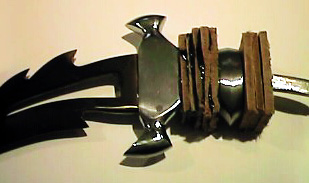
This photo
shows the guard, the first series of leather washers and the spacer in place.
The guard is riveted to the tang and the washers and spacer are held in place
with *two-ton* epoxy. Note that due to the curve of the tang, each washer must
be *wedge* shaped in order to follow the curve - otherwise you will end up with
a gap at the spacer. Make each washer thicker at the top or larger radius of the
curved handle.
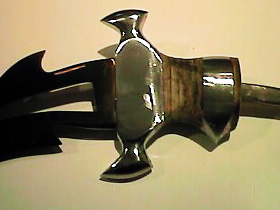
This
photo shows the first set of washers after they have been roughly shaped. This
gives you an easier line of sight while placing the next set of washers. You
don't want to get to the last washer and find you have deviated off of the
centerline of the handle.
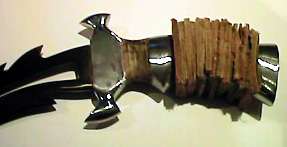
.
This photo shows the final
set of washers and the pommel placed. With the threaded pommel the washers can
be tightly compacted prior to the epoxy hardening.
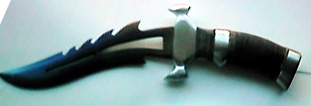
This photo
shows the handle shaped and final polishing of the leather. It only needs the
House symbols and a sheath and its ready for use. We'll go over those next time.
Grinding Primary
Bevels
Qapla'!

Klingon Battleaxe or 'alngegh
(from Okrand's Klingon for the Galactic Traveler)
Adding the final touches
With this project the unique qualities
of the weapon itself make it stand out but there are still small touches that
will distinguish the finer weapons from the mundane. The rivet head at the base
of the blade will be covered with a sterling silver emblem of the IWG. This was
created using a standard jeweler's technique called *lost wax casting* - we'll
examine that process in greater detail in coming months as it not only provides
a source of unique elements and fittings for your projects but it can be adapted
to larger items as well. Imagine casting an entire Sword guard that you have
custom sculpted. Glorious.BR>
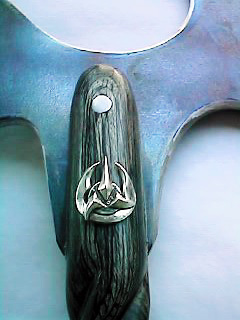
Imperial Weapons Guild symbol in sterling
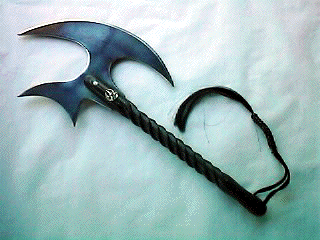
The
final product. A stainless lanyard opening has been placed and a cord made of
braided leather terminating with a long lock of K'Daq's first wife's hair.
Somebody worth fighting for.
Next month we start a new heirloom.....perhaps the jey'naS or a tajtuq
(ceremonial House knife). Or something else. Sword of Kahless ? Let me hear from
you a few weeks before *press* time and it might sway my decision.
mupwI' yI'uchtaH !!





















